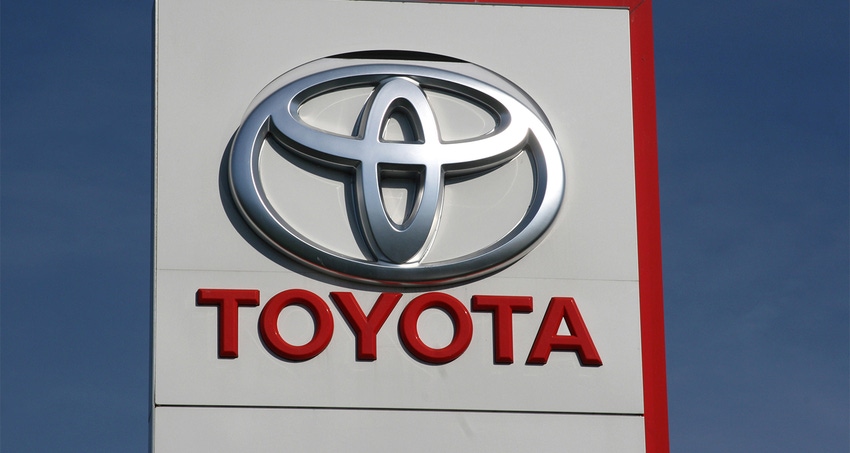Toyota Invests Long-Term in Hydrogen Production
Toyota has commissioned FuelCell Energy to build a system to make renewable electricity, hydrogen, and water for the car maker’s largest port facility in North America. The project is Toyota’s latest in a series of moves in reach of an ambitious corporate goal: net zero emissions from its operations by 2050.

Toyota has commissioned FuelCell Energy to build a system to make renewable electricity, hydrogen, and water for the car maker’s largest port facility in North America. The project is Toyota’s latest in a series of moves in reach of an ambitious corporate goal: net zero emissions from its operations by 2050.
Branded as Tri-gen, FuelCell’s technology will enable the Toyota Logistics Services Center at the Port of Long Beach in California to run on 100% renewable electricity, marking the corporation’s first port facility to be fully powered by renewable electricity, generated onsite.
The hydrogen will go into light-duty electric fuel cell Mirais before they move on from the Long Beach facility to dealers, and it will supply a nearby heavy-duty truck fuel station. A water byproduct of Tri-gen will serve the Long Beach processing facility’s car wash operation.
FuelCell Energy believes its approach, where hydrogen, electricity, and water are made from directed biogas, will have cost and environmental benefits over the conventional method where hydrogen is made by steam reforming fossil fuel-based gas.
Tri-gen-produced hydrogen should avoid more than 4,000 tons of annual greenhouse gas emissions compared to the alternative option.
What makes the technology stand out is that, unlike steam reformation, the process does not burn fuel or consume water; rather it co-produces power and water along with the hydrogen, efficiently yielding multiple usable products with environmental attributes.
Tri-gen is not the only alternative game in town. There’s electrolysis, which works well but is resource intensive. So, if water is scarce and power is expensive, such as in Long Beach, tri-generation is the best option, says Tony Leo, chief technology officer, FuelCell Technology.
Anaergia is supplying the renewable natural gas (RNG) to be converted to hydrogen, which will be produced from food waste and municipal wastewater at a biomethane plant in Victorville, California.
The RNG bumps the end product’s environmental attributes up a level, say the partners. While hydrogen is a zero-emissions fuel, once RNG made from food waste is used in the conversion process, the hydrogen becomes carbon negative.
Yaniv Scherson, chief operating officer Anaergia explains: “Hydrogen needs methane as an input, and if the RNG is from natural gas from fracking it releases net CO2. But if instead we use RNG that is from organic waste that otherwise would emit methane from leaking landfill covers, then the RNG is carbon negative, making the hydrogen carbon negative.”
“Renewable natural gas is a great way to produce renewable hydrogen and electricity at the scale required to support our logistics facility’s carbon-neutral goal,” Mark Yamauchi, sustainability manager for Toyota Motor North America said in a statement.
“And because it is made from waste, renewable natural gas creates the type of circular economy that Toyota is working to expand.”
The Long Beach operation will produce about 2.3-megawatts of clean electricity, enough not only to power the plant but to provide power to the grid. The system will produce about 1.3 tons of hydrogen a day, and it will generate 1,400 gallons of usable water.
Toyota’s Marias have run on hydrogen for years, with the first fuel cell electric Mirai launched in 2015. Now a second-generation model has emerged, first sold in Japan and now California, one of only a very few hydrogen-ready U.S. states.
The corporation has done other work in the renewable hydrogen space, including exploring applications for its heavy-duty class 8 trucks through what became known as Project Portal in 2017.
The car manufacturing giant has worked through several hydrogen vehicle prototypes, and later partnered with the Port of Los Angeles, Kenworth, and Shell, showing that fuel cell electric trucks can match diesel performance while achieving zero-emissions.
Most recently, Toyota earned certification from the California Air Resources Board (CARB) to sell its heavy-duty fuel cell electric powertrain kit as a zero-emission offering in California. Production is slated for later this year, Toyota says.
Its evolving portfolio of powertrains currently includes battery electric vehicles (BEV), fuel cell electric vehicles, hybrid electric vehicles, and plug-in hybrid electrics.
“As we accelerate our focus on BEVs, Toyota will continue to develop a full portfolio of low- and zero-emission electrified solutions that can meaningfully contribute to decarbonizing the transportation sector.
“Toyota is committed to reducing carbon emissions as much as possible, as soon as possible and for everyone. That’s why we are pursuing a multi-pathway approach to affordable electric vehicles,” a Toyota spokesperson told Waste360.
Anaergia and FuelCell are moving forward in their respective niches, including as partners on other carbon-negative hydrogen projects in California where there’s infrastructure to support the work.
Scherson says Anaergia is seeing an uptick in potential partners’ buy in in to the proposition that they use food waste as feedstock in the quest to decarbonize transportation. The company continues to deploy organic waste-sourced RNG for multiple applications—hydrogen, compressed natural gas and liquid fuels, but Sherson could not reveal project details.
FuelCell Energy brought Tri-gen to fruition working with the U.S. Department of Energy, several California agencies, and the University of California at Irvine.
Toyota has signed on with FuelCell to receive Tri-gen products under a 20-year purchase agreement.
About the Author(s)
You May Also Like




